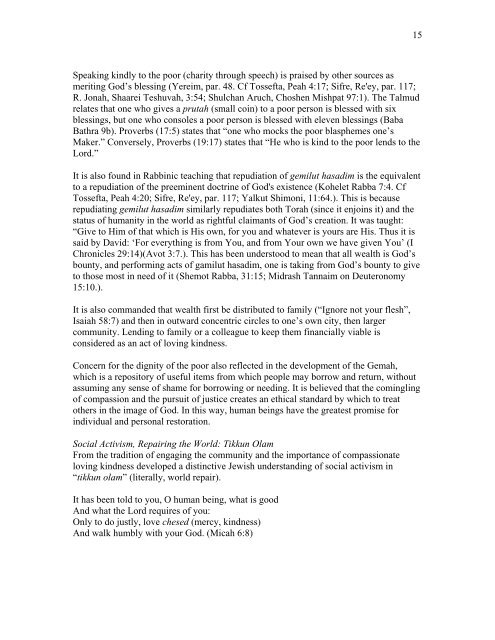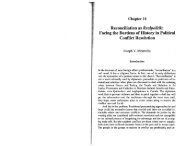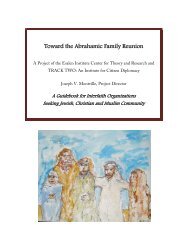The Ethics and Pro-Social Values in Judaism, Christianity and Islam ...
The Ethics and Pro-Social Values in Judaism, Christianity and Islam ...
The Ethics and Pro-Social Values in Judaism, Christianity and Islam ...
Create successful ePaper yourself
Turn your PDF publications into a flip-book with our unique Google optimized e-Paper software.
15<br />
Speak<strong>in</strong>g k<strong>in</strong>dly to the poor (charity through speech) is praised by other sources as<br />
merit<strong>in</strong>g God’s bless<strong>in</strong>g (Yereim, par. 48. Cf Tossefta, Peah 4:17; Sifre, Re'ey, par. 117;<br />
R. Jonah, Shaarei Teshuvah, 3:54; Shulchan Aruch, Choshen Mishpat 97:1). <strong>The</strong> Talmud<br />
relates that one who gives a prutah (small co<strong>in</strong>) to a poor person is blessed with six<br />
bless<strong>in</strong>gs, but one who consoles a poor person is blessed with eleven bless<strong>in</strong>gs (Baba<br />
Bathra 9b). <strong>Pro</strong>verbs (17:5) states that “one who mocks the poor blasphemes one’s<br />
Maker.” Conversely, <strong>Pro</strong>verbs (19:17) states that “He who is k<strong>in</strong>d to the poor lends to the<br />
Lord.”<br />
It is also found <strong>in</strong> Rabb<strong>in</strong>ic teach<strong>in</strong>g that repudiation of gemilut hasadim is the equivalent<br />
to a repudiation of the preem<strong>in</strong>ent doctr<strong>in</strong>e of God's existence (Kohelet Rabba 7:4. Cf<br />
Tossefta, Peah 4:20; Sifre, Re'ey, par. 117; Yalkut Shimoni, 11:64.). This is because<br />
repudiat<strong>in</strong>g gemilut hasadim similarly repudiates both Torah (s<strong>in</strong>ce it enjo<strong>in</strong>s it) <strong>and</strong> the<br />
status of humanity <strong>in</strong> the world as rightful claimants of God’s creation. It was taught:<br />
“Give to Him of that which is His own, for you <strong>and</strong> whatever is yours are His. Thus it is<br />
said by David: ‘For everyth<strong>in</strong>g is from You, <strong>and</strong> from Your own we have given You’ (I<br />
Chronicles 29:14)(Avot 3:7.). This has been understood to mean that all wealth is God’s<br />
bounty, <strong>and</strong> perform<strong>in</strong>g acts of gamilut hasadim, one is tak<strong>in</strong>g from God’s bounty to give<br />
to those most <strong>in</strong> need of it (Shemot Rabba, 31:15; Midrash Tannaim on Deuteronomy<br />
15:10.).<br />
It is also comm<strong>and</strong>ed that wealth first be distributed to family (“Ignore not your flesh”,<br />
Isaiah 58:7) <strong>and</strong> then <strong>in</strong> outward concentric circles to one’s own city, then larger<br />
community. Lend<strong>in</strong>g to family or a colleague to keep them f<strong>in</strong>ancially viable is<br />
considered as an act of lov<strong>in</strong>g k<strong>in</strong>dness.<br />
Concern for the dignity of the poor also reflected <strong>in</strong> the development of the Gemah,<br />
which is a repository of useful items from which people may borrow <strong>and</strong> return, without<br />
assum<strong>in</strong>g any sense of shame for borrow<strong>in</strong>g or need<strong>in</strong>g. It is believed that the com<strong>in</strong>gl<strong>in</strong>g<br />
of compassion <strong>and</strong> the pursuit of justice creates an ethical st<strong>and</strong>ard by which to treat<br />
others <strong>in</strong> the image of God. In this way, human be<strong>in</strong>gs have the greatest promise for<br />
<strong>in</strong>dividual <strong>and</strong> personal restoration.<br />
<strong>Social</strong> Activism, Repair<strong>in</strong>g the World: Tikkun Olam<br />
From the tradition of engag<strong>in</strong>g the community <strong>and</strong> the importance of compassionate<br />
lov<strong>in</strong>g k<strong>in</strong>dness developed a dist<strong>in</strong>ctive Jewish underst<strong>and</strong><strong>in</strong>g of social activism <strong>in</strong><br />
“tikkun olam” (literally, world repair).<br />
It has been told to you, O human be<strong>in</strong>g, what is good<br />
And what the Lord requires of you:<br />
Only to do justly, love chesed (mercy, k<strong>in</strong>dness)<br />
And walk humbly with your God. (Micah 6:8)




